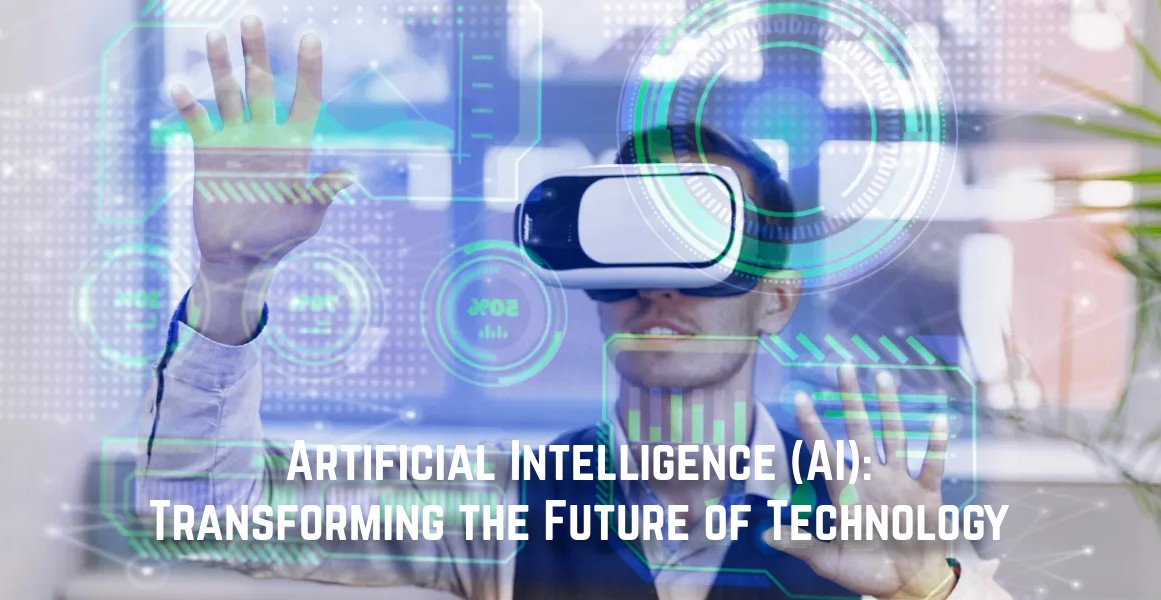
Artificial Intelligence (AI): Transforming the Future of Technology
Created on 5 January, 2025 • 3 minutes read
Discover the transformative power of Artificial Intelligence (AI), its applications, benefits, and future potential. Explore FAQs and insights into how AI is reshaping industries worldwide.
Table of Contents
- Introduction to Artificial Intelligence (AI)
- Key Concepts of Artificial Intelligence
- Types of Artificial Intelligence
- Applications of AI Across Industries
- Advantages and Disadvantages of AI
- The Future of Artificial Intelligence
- FAQs About AI
- Conclusion
1. Introduction to Artificial Intelligence (AI)
Artificial Intelligence (AI) refers to the simulation of human intelligence in machines that are programmed to think, learn, and make decisions. From voice assistants like Siri and Alexa to self-driving cars and advanced medical diagnostics, AI is revolutionizing every aspect of our lives.
With continuous advancements in technology, AI is no longer a futuristic dream but a present-day reality shaping global industries.
2. Key Concepts of Artificial Intelligence
Understanding AI begins with its fundamental concepts:
- Machine Learning (ML): Algorithms that allow computers to learn from data and improve over time.
- Deep Learning: A subset of ML involving neural networks for complex problem-solving.
- Natural Language Processing (NLP): Enables machines to understand, interpret, and respond to human language.
- Computer Vision: Allows machines to interpret and process visual data.
- Robotics: AI-driven machines designed for performing tasks autonomously.
These technologies work together to build smarter systems capable of solving real-world problems.
3. Types of Artificial Intelligence
AI can be categorized into three main types:
3.1 Narrow AI (Weak AI)
Designed for specific tasks, such as voice assistants or recommendation algorithms.
3.2 General AI (Strong AI)
Hypothetical AI capable of understanding, learning, and performing any intellectual task a human can do.
3.3 Artificial Superintelligence (ASI)
A future concept where machines surpass human intelligence and capabilities.
Currently, most AI systems fall under Narrow AI, but advancements are steadily paving the way toward General AI.
4. Applications of AI Across Industries
Artificial Intelligence is transforming industries in unprecedented ways:
4.1 Healthcare
- Disease diagnosis and early detection
- AI-powered robotic surgeries
- Drug discovery and development
4.2 Finance
- Fraud detection and prevention
- Algorithmic trading
- Personalized financial advice
4.3 Education
- AI-powered tutoring systems
- Smart content creation
- Personalized learning experiences
4.4 E-commerce
- Product recommendations
- Chatbots for customer support
- Inventory management
4.5 Transportation
- Autonomous vehicles
- Traffic optimization systems
- Predictive maintenance
Each sector continues to experience exponential growth with the adoption of AI technologies.
5. Advantages and Disadvantages of AI
5.1 Advantages of AI:
- Increased efficiency and productivity
- Reduced human errors
- Data-driven decision-making
- Enhanced customer experience
5.2 Disadvantages of AI:
- High implementation costs
- Job displacement
- Dependence on technology
- Ethical concerns and biases
Balancing the benefits and challenges of AI is essential to ensure ethical and responsible use.
6. The Future of Artificial Intelligence
The future of AI promises groundbreaking advancements:
- AI in Space Exploration: Autonomous robots for space missions.
- Smart Cities: AI-driven urban planning and traffic management.
- Enhanced Cybersecurity: AI for detecting and preventing cyber threats.
- Healthcare Revolution: Precision medicine tailored to individual genetic profiles.
While the future is bright, it’s crucial to address ethical concerns and ensure AI benefits everyone equally.
7. FAQs About AI
Q1: What is Artificial Intelligence (AI)?
A: AI refers to machines or systems that mimic human intelligence to perform tasks, learn, and improve from experience.
Q2: Is AI replacing human jobs?
A: While AI automates repetitive tasks, it also creates new job opportunities in AI development, ethics, and management.
Q3: What are some real-life examples of AI?
A: Virtual assistants, facial recognition systems, self-driving cars, and fraud detection tools.
Q4: What skills are needed for a career in AI?
A: Proficiency in programming languages (e.g., Python), machine learning, data analysis, and problem-solving.
Q5: Is AI safe for humanity?
A: With proper regulations and ethical guidelines, AI can be harnessed for the betterment of society.
Q6: Can AI think like a human?
A: Current AI systems can simulate human-like behavior but lack self-awareness or emotions.
Conclusion
Artificial Intelligence is no longer just a buzzword; it’s a transformative force reshaping our world. From revolutionizing industries to improving daily life, AI has become indispensable. However, as AI continues to evolve, society must address the challenges and ethical concerns surrounding its deployment.
For individuals and businesses, understanding and leveraging AI is no longer optional but essential for staying competitive in the digital age.
Related reading: